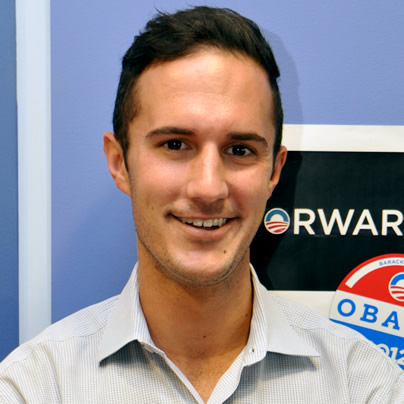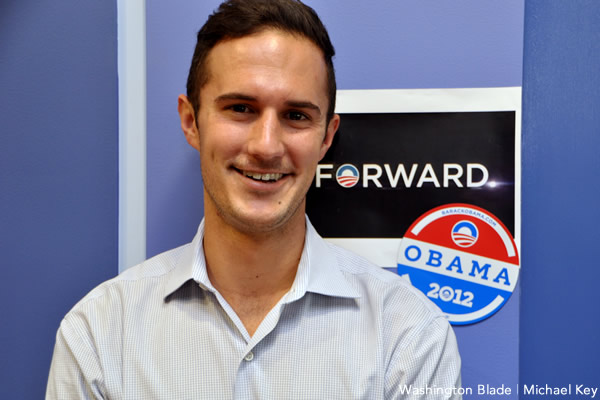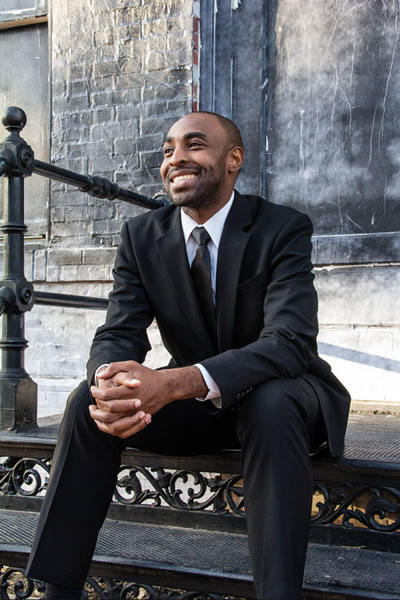Local
D.C. gays mobilize to re-elect Obama
Supporters traveling to help in Colorado, Virginia, Ohio


Crosby Burns will travel to Colorado next week to campaign for President Obama. (Washington Blade photo by Michael Key)
With only a few weeks remaining before Election Day, several members of D.C.’s LGBT community are literally going to great lengths to ensure President Obama wins another four years in the White House.
Opportunities to help push Obama over the edge in battleground states are driving local LGBT supporters to travel to far off places — including Colorado and Ohio — where the results on Nov. 6 could decide the election.
Crosby Burns, 25, a gay D.C. resident, said he agreed to travel to Colorado to help the Obama campaign — an expedition he made during Obama’s first campaign in 2008 — after looking at polls showing a tightening race between Obama and Mitt Romney.
“A couple of weeks ago, I was just looking at polls and seeing Mitt Romney speak, and I was just thinking the president needs us more than ever,” Burns said. “That’s what I did back in 2008, I’m going to do the exact same thing, if not more, to ensure that the president is re-elected and that Colorado stays ‘blue’ for him in 2012.”
Burns, a research associate on LGBT issues at the Center for American Progress Action Fund, said the Obama campaign is sending him Monday to West Denver, Colo. — a predominately Latino area — where he intends to employ his Spanish-speaking skills to help with get-out-the-vote efforts.
“I’m going to be going door-to-door using my Spanish skills and talking with people about the election and making sure they know where their polling place is and making sure they support the president,” Burns said.
Collin Burton, 32, a gay D.C. resident, said he’s taking personal leave from his job to make a similar trip to his hometown of Columbus, Ohio, on Monday to help manage out-of-state volunteers coming into the battleground state to campaign for Obama.
“As we get closer to Election Day, we’ll be running some GOTV operations and helping out with the regional work, so it’ll be good,” Burton said. “We will hopefully get a lot of people through and get a lot of voters contacted, make sure that they know they need to turn out.”
Burton, who handles government relations as an appointee to the Corporation for National & Community Service, estimated that he would manage between 20 and 100 Obama supporters coming into the state from more assuredly Democratic parts of the country, such as D.C., New York and Eastern Pennsylvania.
It’s not the first time Burton has helped with Democratic Party efforts. In 2010 for the mid-term elections, he was designated the LGBT caucus director for the Ohio Democratic Party.
But Burton said he hopes the outcome is different this time around as opposed to the mid-term election, when an anti-incumbent wave swept a sea of Republicans into office, including in Ohio.
“I hope it’s a hell of a lot better, I’ll be honest, because the outcome in 2010 in Ohio was pretty bad,” Burton said. “It went from a wonderfully “blue” state to an incredibly red state. I’m confident that it will [be better this time]. I’m certain that the Obama ground game is up and running and will be rocking it for Ohio.”
Some LGBT Obama supporters in D.C. are taking advantage of opportunities within the area to campaign for the president, especially because the battleground state of Virginia is just across the Potomac River.
Clarence Fluker, 33 and a gay D.C. resident, said he’s been participating in LGBT phone banking each Thursday night at the Democratic National Committee to talk with potential voters — mainly in Virginia — and educate them about Obama’s record.
“Sometimes people say that they’re undecided, but we talk to them and log all of the information from the calls and send it over at the end of the night to the person who’s running the phone bank,” Fluker said.

Clarence Fluker is participating in weekly phone banks at the Democratic National Committee (Photo by Cesar Vence Photography)
Fluker, who works for the D.C. Commission on National and Community Service, said he also plans to make a trip during an upcoming weekend to Virginia to knock on doors and talk about Obama personally with voters.
“I think it’s helpful because this campaign is really going to be won on the ground, and it’s going to be won by reaching out to everyday Americans and asking for their support, educating them about all the wonderful things the Obama administration has done and all the things that we know that they’re going to do in the second term,” Fluker said.
Clo Ewing, an Obama campaign spokesperson, said Obama’s LGBT supporters recognize the president “has done more to advance gay rights than any other president” — citing “Don’t Ask, Don’t Tell” repeal, mandating hospital visitation rights and calling for repeal of the Defense of Marriage Act as among his accomplishments.
“That record stands in stark contrast to Mitt Romney’s, who promised to be to the left of Sen. [Ted] Kennedy on gay rights and then made clear he would have left ‘Don’t Ask, Don’t Tell’ in place and is working to enshrine discrimination into the Constitution by passing a federal marriage amendment,” Ewing said. “From grassroots organizing to phone banking to registering voters, LGBT supporters are working hard because there’s too much at stake to sit on the sidelines.”
The Washington Blade was unable to find local LGBT supporters of Mitt Romney’s campaign who are undertaking efforts to help the Republican nominee win the White House.
Each of the Obama LGBT supporters who spoke with the Washington Blade said the president’s work on LGBT issues was deeply personal for them and a motiving factor in helping them decide to contribute to the campaign.
Burton said he was particularly grateful Obama took action to benefit LGBT people through administrative steps, such as the hospital visitation rights memo he issued for same-sex partners.
As a federal employee, Burton took particular note of the memorandum Obama signed in 2009 granting limited domestic partner benefits to government workers.
“Extending those rights, it matters quite a bit, and it’s incredible to see him actually move the pen for that,” Burton said.
Fluker said he was moved when Obama announced in May he had completed his evolution to support marriage equality — particularly because those words came from the nation’s first black president.
“When President Obama talked about his own personal walk, how he got to the point where he also supports same-sex marriage, that meant a lot to me not just as black gay man, but as an American, to have a leader who felt that way,” Fluker said.
For Burns, the president’s announcement that he now supports marriage equality was important, as well as Obama’s other work in advancing gay rights.
“That’s an issue that’s near and dear to my heart and to see him fully evolve on this issue was just very validating as an Obama supporter and as a gay man,” Burns said.
Maryland
Md. Commission on LGBTQIA+ Affairs released updated student recommendations
LGBTQ students report higher rates of bullying, suicide

The Maryland Commission on LGBTQIA+ Affairs has released updated recommendations on how the state’s schools can support LGBTQ students.
The updated 16-page document outlines eight “actionable recommendations” for Maryland schools, supplemented with data and links to additional resources. The recommendations are:
- Developing and passing a uniform statewide and comprehensive policy aimed at protecting “transgender, nonbinary, and gender expansive students” against discrimination. The recommendation lists minimum requirements for the policy to address: name, pronoun usage, and restroom access.
- Requiring all educators to receive training about the specific needs of LGBTQ students, by trained facilitators. The training’s “core competencies” include instruction on terminology, data, and support for students.
- Implementing LGBTQ-inclusive curricula and preventing book bans. The report highlights a “comprehensive sexual education curriculum” as specifically important in the overall education curriculum. It also states the curriculum will “provide all students with life-saving information about how to protect themselves and others in sexual and romantic situations.”
- Establishing Gender Sexuality Alliances “at all schools and in all grade levels.” This recommendation includes measures on how to adequately establish effective GSAs, such as campaign advertising, and official state resources that outline how to establish and maintain a GSA.
- Providing resources to students’ family members and supporters. This recommendation proposes partnering with local education agencies to provide “culturally responsive, LGBTQIA+ affirming family engagement initiatives.”
- Collecting statewide data on LGBTQ youth. The data on Maryland’s LGBTQ youth population is sparse and non-exhaustive, and this recommendation seeks to collect information to inform policy and programming across the state for LGBTQ youth.
- Hiring a full-time team at the Maryland Department of Education that focuses on LGBTQ student achievement. These employees would have specific duties that include “advising on local and state, and federal policy” as well as developing the LGBTQ curriculum, and organizing the data and family resources.
- Promoting and ensuring awareness of the 2024 guidelines to support LGBTQ students.
The commission has 21 members, with elections every year, and open volunteer positions. It was created in 2021 and amended in 2023 to add more members.
The Governor’s Office of Communication says the commission’s goal is “to serve LGBTQIA+ Marylanders by galvanizing community voices, researching and addressing challenges, and advocating for policies to advance equity and inclusion.”
The commission is tasked with coming up with yearly recommendations. This year’s aim “to ensure that every child can learn in a safe, inclusive, and supportive environment.”
The Human Rights Campaign’s most recent report on LGBTQ youth revealed that 46.1 percent of LGBTQ youth felt unsafe in some school settings. Those numbers are higher for transgender students, with 54.9 percent of them saying they feel unsafe in school.
Maryland’s High School Youth Risk Behavior Survey reveals a disparity in mental health issues and concerns among students who identify as LGBTQ, compared to those who are heterosexual. LGBTQ students report higher rates of bullying, feelings of hopelessness, and suicidal thoughts. Nearly 36 percent of LGBTQ students report they have a suicide plan, and 26.7 percent of respondents say they have attempted to die by suicide.
The commission’s recommendations seek to combat the mental health crisis among the state’s LGBTQ students. They are also a call for local and state governments to work towards implementing them.
Virginia
Va. lawmakers consider partial restoration of Ryan White funds
State Department of Health in 2025 cut $20 million from Part B program

The Virginia General Assembly is considering the partial restoration of HIV funding that the state’s Department of Health cut last year.
The Department of Health in 2025 cut $20 million — or 67 percent of total funding — from the Ryan White Part B program.
The funding cuts started with the Trump-Vance administration passing budget cuts to federal HIV screening and protection programs. Rebate issues between the Virginia Department of Health and the company that provides HIV medications began.
Advocates say the funding cuts have disproportionately impacted lower-income people.
The Ryan White HIV/AIDS Program, a federal program started in 1990, provides medical services, public education, and essential services. Part B offers 21 services, seven of which remained funded after the budget cuts.
Equality Virginia notes “in 2025, a 67 percent reduction severely destabilized HIV services across the commonwealth.”
Virginia lawmakers have approved two bills — House Bill 30 and Senate Bill 30 — that would partially restore the funding. The Ryan White cuts remain a concern among community members.
Both chambers of the General Assembly must review their proposed changes before lawmakers can adopt the bills.
“While these amendments aren’t a full restoration of what community-based organizations lost, this marks a critical step toward stabilizing care for thousands of Virginians living with HIV,” said Equality Virginia Executive Director Narissa Rahaman. “Equality Virginia plans to continue their contact with lawmakers and delegates through the conference and up until the passing of the budget.”
“We appreciate lawmakers from both sides of the aisle who recognized the urgency of this moment and will work to ensure funding remains in the final version signed by the governor,” added Rahaman.
District of Columbia
D.C. Black Pride theme, performers announced at ‘Speakeasy’
Durand Bernarr to headline 2026 programming

The Center for Black Equity held its 2026 DC Black Pride Theme Reveal event at Union Stage on Monday. The evening, a “Speakeasy Happy Hour,” was hosted by Anthony Oakes and featured performances by Lolita Leopard and Keith Angelo. The Center for Black Equity organizes DC Black Pride.
Kenya Hutton, Center for Black Equity president and CEO, spoke following the performances by Leopard and Angelo. Hutton announced this year’s theme for DC Black Pride: “New Black Renaissance.”
Performers for 2026 DC Black Pride were announced to be Bang Garcon, Be Steadwell, Jay Columbus, Bennu Byrd, Rue Pratt and Akeem Woods.
Singer-songwriter Durand Bernarr was announced as the headliner for the 2026 festivities. Bernerr gave brief remarks through a video played on the screen at the stage.
DC Black Pride is scheduled for May 22-25. For more information on DC Black Pride, visit dcblackpride.org.


















